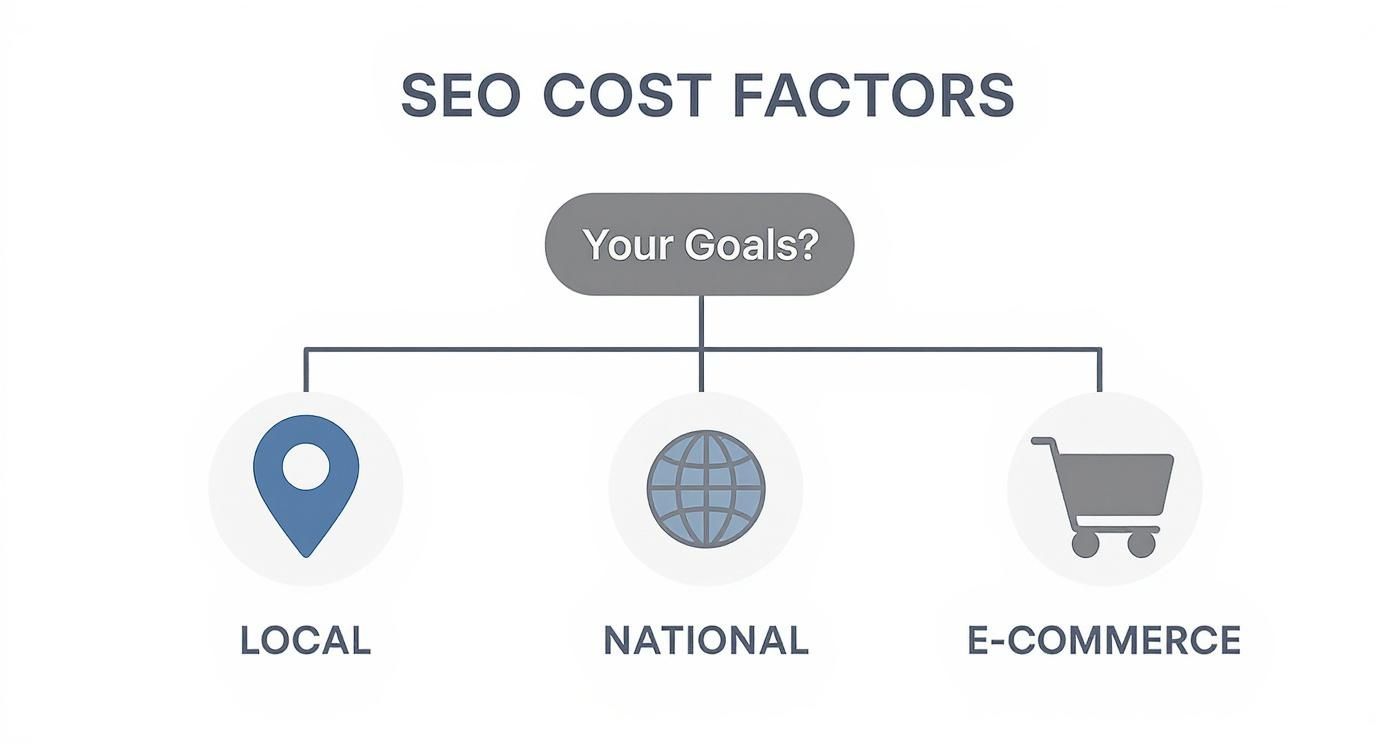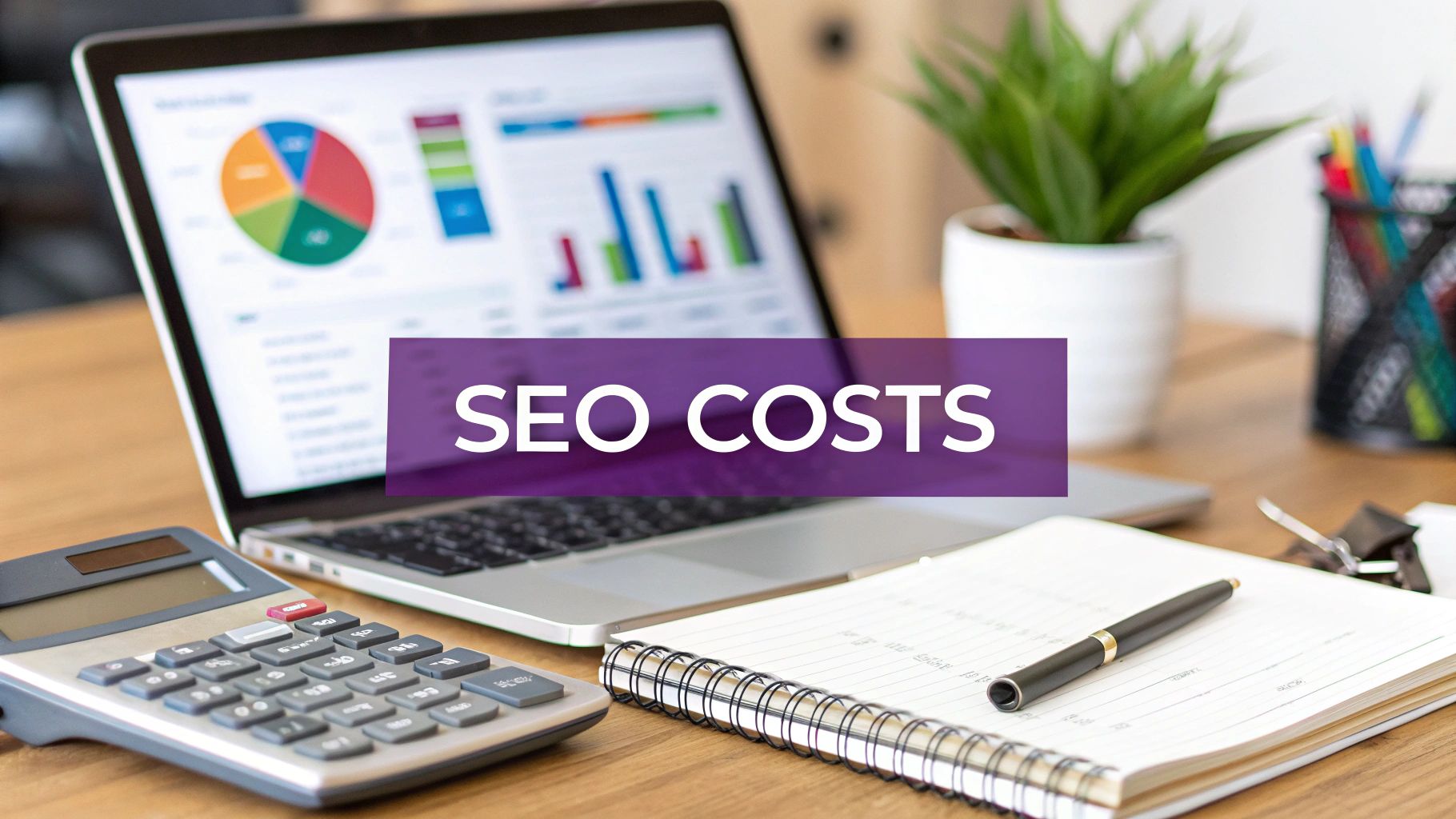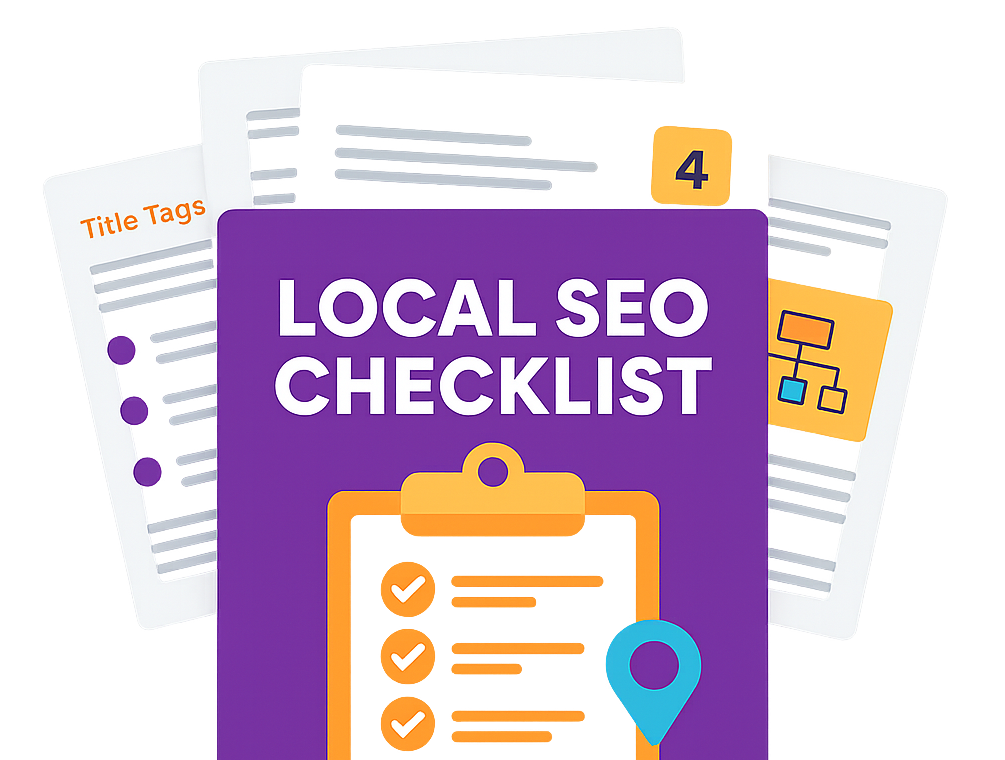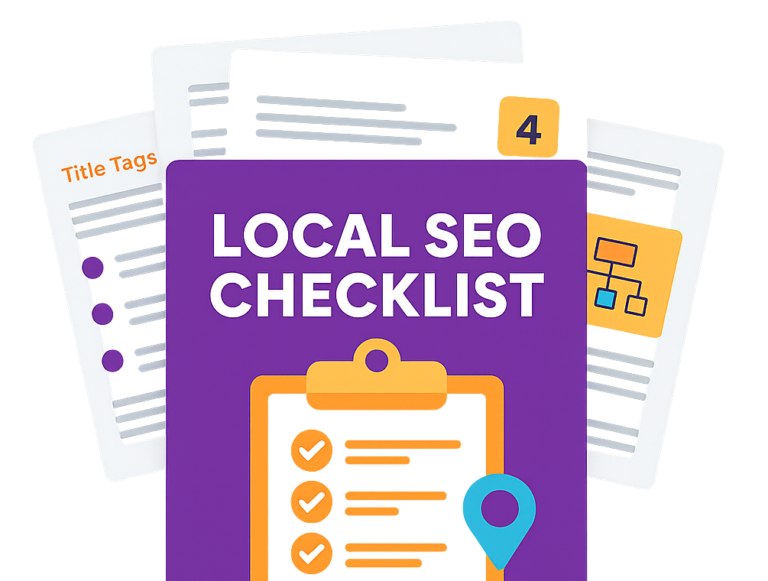For most small businesses in the UK, a realistic monthly SEO budget lands somewhere between £500 and £2,500. But let's be clear: that's a ballpark figure. The final number really depends on your goals, your industry, and the heavy lifting required to get you real, tangible results.
How Much Should a Small Business Budget for SEO?

Trying to pin down the "right" SEO budget can feel like guesswork because there’s no one-size-fits-all price. Your investment is tied directly to what you want to achieve and how tough your market is.
Think of it like buying a vehicle for your business. A local florist in Cambridge might just need a small, efficient delivery van. That’s a completely different cost and purpose compared to a nationwide logistics firm that needs a fleet of lorries.
Both are smart investments, but their scale dictates the price. It's the same with SEO. The seo costs for a small business targeting customers in Cambridgeshire will look very different from an e-commerce brand trying to compete across the entire UK. Your budget simply reflects the amount of work and expertise needed to close the gap between where you are now and where you want to be.
To give you a clearer picture of what you might expect to pay, we've put together a quick summary of typical monthly costs in the UK.
Typical Monthly UK SEO Costs at a Glance
| Provider / Service Level | Typical Monthly Cost (£) | Best For |
|---|---|---|
| Freelancer / Basic SEO | £200 – £800 | Local businesses, sole traders, or startups needing foundational support. |
| Small SEO Agency | £800 – £2,500 | Growing businesses needing a comprehensive strategy and consistent execution. |
| Mid-Sized Agency | £2,500 – £5,000+ | Businesses in competitive markets or those aiming for national visibility. |
This table shows how costs scale with the provider and the intensity of the campaign. A smaller investment gets your foot in the door, while a larger budget fuels more aggressive growth.
Different Tiers of SEO Investment
To give you a clearer picture, SEO services are often broken down into different tiers. A basic package will get the fundamentals right, while a more comprehensive plan brings a much more aggressive and wide-ranging strategy to the table.
For example, a typical local SEO package for a small UK business often falls between £200 and £800 per month. This makes it a great starting point for local shops, salons, and tradespeople who just want to show up when nearby customers are searching. On the other end, a one-off project like a deep-dive website audit could range from £500 to £5,000, all depending on how big and complex your site is.
The best way to think about SEO is not as a cost, but as an investment. It’s a marketing channel that builds a long-term asset for your business. A solid strategy generates visibility, drives the right kind of traffic, and keeps producing leads and sales for years.
Getting your head around these different investment levels is the first step. It helps you find a solution that feels right for your budget and your ambitions. By looking at the options, you can find affordable SEO for small business that delivers a genuine return. It’s all about matching the right level of service to your goals, making sure every pound you spend is pushing you forward.
Understanding What Influences Your SEO Costs
Ever get two SEO quotes for the same website and wonder why one is double the other? It’s a fair question. The truth is, SEO pricing isn't pulled out of thin air. It’s a direct reflection of the work, time, and resources needed to hit your business goals in your specific market.
Think of it like hiring a personal trainer. Someone training for a local 5k fun run needs a very different programme and intensity compared to someone gearing up for a national marathon. Both want to get fit, but the scale of their ambition and the level of competition directly shape the investment required.
It’s exactly the same with SEO. The seo costs for a small business are determined by a few key factors that define how big and complex the job is. Getting your head around these variables will help you have much smarter conversations with potential agencies and see the cost for what it is: a strategic investment, not just another expense.
Your Business Goals and Ambitions
The single biggest factor driving your SEO costs is what you actually want to achieve. A clear goal sets the direction for the entire strategy, from the keywords we chase to the content we create.
Are you a local plumber in Cambridge trying to own the map pack for searches like "emergency plumber near me"? That calls for a tight local SEO strategy, zeroing in on your Google Business Profile, local directory listings, and content aimed at your geographical area.
Or maybe you’re an e-commerce startup selling handmade leather goods across the UK? That’s a whole different ball game. It demands a much broader, more aggressive national SEO campaign involving deep keyword research, competitor teardowns, a solid content plan, and a serious push to build high-quality backlinks. We cover the nuts and bolts of that in our guide on how to build backlinks. Each goal requires a different level of muscle, and therefore, a different budget.
Your SEO budget is a direct reflection of your ambition. A bigger goal, like becoming a national leader, will naturally require a more substantial and sustained investment to outmuscle the competition and win a larger slice of the market.
Your Industry and Competitive Landscape
Next up is the competitiveness of your industry. Some sectors are simply more crowded and tougher to rank in than others. It's just the way it is.
For instance, a niche business like a specialist artisan bakery in a small town will face a lot less online competition than a law firm in central London. The legal world is notoriously fierce online, with established firms pouring tens of thousands of pounds into SEO every single month.
To stand a chance in a competitive space, your strategy has to be more intense. This means:
- More in-depth content: Creating genuinely authoritative articles, guides, and resources that are head and shoulders above what your competitors are putting out.
- A more aggressive link-building campaign: Earning links from high-authority websites to build your site's credibility and prove to Google you’re the real deal.
- Advanced technical optimisation: Making sure your website is technically flawless, offering a perfect user experience, and is set up perfectly for search engines.
The level of competition dictates the firepower required to make a dent, which in turn shapes the time and resources needed. While looking for a cheaper alternative to Ahrefs or other top-tier tools can help manage your budget, it doesn't change the underlying need for intensive work if you want to win.
The Current Health of Your Website
Finally, where you're starting from matters a great deal. A brand-new website with zero authority is a blank slate. It needs significant foundational work just to build trust with search engines, and that takes time.
On the flip side, an older website might have some existing authority but could be weighed down by technical gremlins, a dodgy backlink profile, or even old Google penalties. Fixing these problems is a different kind of effort, often involving deep technical audits and clean-up campaigns before you can even think about growth. A healthy, well-optimised website gives us a much stronger launchpad, often allowing the budget to be focused on content and outreach right from day one.
Comparing SEO Provider Models
Deciding who does your SEO is just as critical as deciding what gets done. It’s a choice that directly shapes your budget, the results you see, and how much of your own time you’ll need to invest. Think of it as your guide to the three main paths any small business can take to grow through search.
Let's use a home renovation analogy to make things clearer. Hiring a freelancer is like calling in a specialist electrician for a specific job. Partnering with an agency is like bringing in a general contractor to manage the entire project from start to finish. And building an in-house team? That’s the full DIY approach, where you buy all the tools and learn the trade yourself.
Each option comes with its own set of pros, cons, and costs. Getting to grips with them is the key to finding the right fit for your business, your budget, and your ambitions.
The Independent SEO Freelancer
An SEO freelancer is a self-employed specialist. They often have deep expertise in one or two areas, like technical audits, local search, or content strategy. They’re the skilled tradespeople you hire for a specific, well-defined task.
Working with a freelancer is usually the most direct and budget-friendly route. You’re paying for one expert's time, not the overheads of a big company. This makes them a fantastic option for businesses with clear, limited needs or those just dipping their toes into SEO.
The main drawback, however, is capacity. A freelancer is just one person. They can get stretched thin trying to juggle a complex campaign that needs technical SEO, content writing, digital PR, and web development all at once. Relying on a single person also creates a single point of failure if they get sick or become unavailable.
The Full-Service SEO Agency
An SEO agency is your general contractor. They bring together a whole team of specialists—strategists, content writers, technical gurus, and outreach managers—all under one roof. When you team up with an agency, you’re not just hiring an individual; you’re tapping into a collective pool of expertise and resources.
This model is perfect for businesses that need a comprehensive, ongoing strategy. An agency can handle every part of your SEO, from the initial audit to execution and reporting, which frees you up to focus on running your business. They have the systems and people to manage more demanding campaigns and pivot quickly when things change.
The trade-off, of course, is the cost. Agency retainers are higher because they reflect the value of an entire team and the proven processes that get consistent results. You're paying for a fully managed, end-to-end service designed for growth.
The Dedicated In-House Team
Bringing SEO in-house is the biggest commitment of all. It means hiring one or more full-time employees to manage your search strategy. This is like becoming your own general contractor—a path that gives you total control but also comes with the most responsibility.
This option gives you a dedicated resource that lives and breathes your brand every single day. They’ll develop an intimate understanding of your business that no external partner can ever quite match. However, the costs go far beyond just a salary; you also have to budget for expensive SEO tools, continuous training, and benefits.
When it comes to the typical monthly seo costs for small business in the UK, the figures can vary quite a bit across these models, usually falling somewhere between £500 to £2,500. Freelancers often work in the £500 to £1,200 range for specific tasks, while agencies typically start from £1,000 to £2,500 for more complete strategies. An in-house team is a much larger investment, with salaries starting from £18,000 annually plus monthly tool costs.
Deciding to go the in-house or DIY route requires a serious investment of both time and money. If you're considering this path, our guide on how to do SEO yourself provides a realistic look at what's involved.
To help you weigh up the options, here’s a straightforward comparison table.
Comparison of SEO Provider Options
| Factor | SEO Freelancer | SEO Agency | In-House Team |
|---|---|---|---|
| Typical Cost | Lower (e.g., £500 – £1,200/month) | Higher (e.g., £1,000 – £2,500+/month) | Highest (Salary + tools + benefits) |
| Expertise | Specialist in 1-2 areas (e.g., content, technical) | Broad team of specialists under one roof | Deep knowledge of your specific business |
| Flexibility | High; good for short-term projects or specific tasks | Moderate; often requires longer-term retainers | Low; hiring/firing is a major process |
| Capacity | Limited; one person's workload | High; a full team can handle complex campaigns | Varies based on team size and skill |
| Best For | Startups, small businesses with specific needs, or those on a tight budget | Businesses ready for sustained growth and needing a comprehensive strategy | Larger businesses with the budget and need for a dedicated, full-time focus |
| Biggest Pro | Cost-effective and direct communication | Access to a diverse skill set and proven processes | Unmatched brand alignment and focus |
| Biggest Con | Limited bandwidth and potential single point of failure | Higher cost and less personal than a freelancer | Very expensive and difficult to build a skilled team |
This table should give you a good sense of where each model shines and where the potential pitfalls lie, making it easier to match a provider to your business's current stage and future goals.
The flowchart below shows how your main business goal—whether it's local, national, or e-commerce—is the first thing you need to figure out. It directly influences the kind of SEO approach you'll need and what it's likely to cost.

Ultimately, the key takeaway is that your business objectives directly shape the complexity and cost of your SEO, guiding you toward the most suitable provider model.
Putting It All Together: Example SEO Budgets for UK Small Businesses

All the theory is great, but what does an SEO budget actually look like in the real world? This is where the numbers start to click. Let’s walk through three common scenarios for UK small businesses to see how a monthly investment translates into real activity and results.
We'll explore what a specific budget can realistically achieve, the kind of work involved, and a sensible timeline for seeing a return. This should help you picture how your own SEO costs for a small business could be put to good use.
Scenario 1: The Local Tradesperson in Bristol
Let's imagine "Bristol Boilers," a small plumbing and heating company. Their mission is straightforward: get to the top of local search results so their phone rings for emergency repairs and boiler installations within a 15-mile radius of Bristol.
- Monthly Budget: £600
- Primary Goal: Generate qualified local leads and phone enquiries.
With a budget like this, the focus is razor-sharp and hyper-local. The strategy isn't about ranking across the UK; it's about being the first name someone sees when their boiler gives up the ghost in BS1.
What This Budget Buys You:
- Google Business Profile (GBP) Optimisation: This is the absolute cornerstone of local search. It means keeping the profile perfectly filled out, photos updated, services listed, and making sure new customer reviews are encouraged and responded to quickly.
- On-Page SEO for Core Services: Dialling in the "Boiler Repair," "New Boiler Installation," and "Emergency Plumber" pages with Bristol-specific keywords and unmissable calls to action.
- Local Citation Building: Getting the business name, address, and phone number (NAP) listed consistently across key UK directories like Yell, Thomson Local, and trade-specific sites to build local authority.
- One High-Quality Blog Post Per Month: A genuinely useful article like "5 Signs Your Boiler Needs Replacing This Winter" or "How to Choose the Right Boiler for Your Bristol Home." This positions them as the local expert answering common customer questions.
- Monthly Performance Reporting: A clear, no-fluff report tracking local rankings, GBP views, clicks-to-call, and website contact form submissions.
For a local business, the goal isn't just traffic—it's action. A £600 monthly investment is squarely aimed at making the phone ring with high-intent customers who are ready to book a job. You can often see an uptick in local calls within 3-6 months.
Scenario 2: The Nationwide E-commerce Startup
Now, picture "Artisan Threads," an online shop selling handmade, sustainable clothing. They ship UK-wide and need to attract customers searching for ethical fashion, going up against small boutiques and bigger retailers.
- Monthly Budget: £1,500
- Primary Goal: Increase organic traffic, improve product visibility, and drive online sales.
This budget has to work harder, covering a much wider area and a more competitive market. The strategy shifts from local domination to building a national brand presence through great content and authority.
What This Budget Buys You:
- Technical SEO Foundation: Kicking off with a thorough audit to fix any site speed issues, mobile usability problems, and ensure every product page can be found and indexed by Google.
- Comprehensive Keyword Research: Pinpointing the commercial keywords for product categories (like "organic cotton dresses UK") and the informational keywords for the blog (like "what is slow fashion").
- Category and Product Page Optimisation: Rewriting meta titles, descriptions, and product details to make them more compelling and improve click-through rates from the search results.
- Strategic Content Creation: Producing two in-depth blog posts a month that build brand authority. Think "A Guide to Sustainable Fabrics" or "How to Build a Capsule Wardrobe"—content that attracts people at the start of their buying journey.
- Foundational Link Building: Proactively reaching out to fashion bloggers and ethical lifestyle websites to earn valuable backlinks. This is what builds the site's authority and trust with Google.
With e-commerce, results are measured in traffic and, ultimately, sales. A £1,500 budget allows for a consistent, multi-pronged strategy. You'd expect to see initial ranking improvements in 4-6 months, with meaningful traffic growth taking 6-12 months as the content and backlinks really start to kick in.
Scenario 3: The B2B Technology Consultant in London
Finally, meet "Innovate IT," a consultancy targeting financial services companies in London. Their sales cycle is long, and the goal isn't just traffic; it's about generating high-value leads by becoming known as industry thought leaders.
- Monthly Budget: £3,000
- Primary Goal: Attract C-level executives with authoritative content and generate qualified B2B leads.
This is a tough, niche B2B market. The SEO costs for this small business are higher because the strategy depends on creating expert-level content and building rock-solid credibility in a very discerning industry.
What This Budget Buys You:
- In-Depth Competitor Analysis: A deep dive into what rival consultancies are doing to rank, identifying content gaps and strategic openings we can exploit.
- High-Authority Content Production: Creating one major content asset each month, like a detailed white paper, an industry research report, or a comprehensive case study. This is the kind of content that attracts links and downloads.
- Digital PR and Outreach: Actively promoting that high-value content to financial journalists, industry publications, and professional networks to earn powerful backlinks and media mentions.
- LinkedIn Integration: Using the content to fuel LinkedIn posts and articles, directly targeting decision-makers at specific London firms.
- Conversion Rate Optimisation (CRO): A/B testing landing pages and calls to action to squeeze the maximum value out of every visitor, turning them into leads.
For B2B, SEO is a long game focused on authority. This investment is designed to secure fewer leads, but ones that are of much higher value. Initial visibility for core topics might take 6-9 months, with organic search becoming a consistent lead generation channel after the first year.
Thinking Beyond Cost to Measure SEO ROI
It’s a common mistake to see SEO as just another monthly expense on the balance sheet. But its real power lies in delivering a measurable Return on Investment (ROI), turning it from a simple cost into a genuine growth engine for your business.
To really get your head around its value, you need to look past the surface-level stuff like traffic spikes or keyword rankings. Don’t get me wrong, they’re useful indicators, but they don't paint the full picture. The real impact is what hits your bottom line.
This means homing in on the metrics that truly matter: the number of qualified leads coming in, your website's conversion rate, the average lifetime value of a customer, and how much you're cutting your overall cost to win a new client.
Calculating Your SEO Return on Investment
Working out your SEO ROI doesn't need to be a complicated maths problem. It all boils down to a straightforward formula that stacks up the revenue from your SEO efforts against what you paid for it.
(Revenue from SEO − Cost of SEO) / Cost of SEO = SEO ROI
Let's say you invest £1,000 in SEO for a month, and that work brings in £5,000 of new business. Your ROI is a tidy 400%. This simple calculation completely changes the conversation from "How much does SEO cost?" to "How much revenue can SEO generate?"
This way of thinking gives you the ammo you need to justify the budget and hold any provider accountable for delivering tangible, profitable results. It turns the monthly report from a list of rankings into a clear statement of financial performance.
A Practical ROI Example
Let's ground this with a realistic scenario for a small business. Imagine a local electrician in Cambridgeshire puts £800 per month into a targeted local SEO campaign.
-
The Investment: The monthly cost for the SEO service is £800.
-
The Results: After a few months, the campaign starts delivering 10 new, qualified leads each month, all coming directly from organic search.
-
The Conversion: The electrician's team is good at what they do, and they convert 30% of these leads into paying customers. That's 3 new jobs a month from SEO.
-
The Value: The average value of each job is £600.
Now for the fun part—the maths. Three new jobs at £600 a pop adds up to £1,800 in new revenue that month.
Let's plug that into our formula:
- (£1,800 Revenue − £800 Cost) / £800 Cost = 1.25
To turn that into a percentage, just multiply by 100, which gives you an ROI of 125%. For every £1 the business spent on SEO, they got £2.25 back. It’s a perfect example of how a consistent monthly spend on SEO can generate a seriously positive return over time. To find even more unique advantages, unlocking SEO opportunities with an expired domain name finder can be a clever move to boost this return even further.
How to Choose the Right SEO Partner
You’ve got a handle on the costs and a clear idea of the return you’re after. Now for the final, most crucial piece of the puzzle: picking the right expert to get you there. This isn’t just about hiring a supplier; it’s about finding a genuine partner who gets your business and is invested in your success. Get this right, and you're set for the long haul.
A good decision here means looking past the slick sales pitch. You need to get a feel for their actual process, how they communicate, and what they’ve achieved for businesses like yours. The best SEO partners are transparent, think strategically, and focus on what actually grows your business—not just on vanity metrics that look good in a report.
Key Questions to Ask Any Potential Provider
Before you even think about signing a contract, you need to ask some direct questions. The way they answer will tell you everything you need to know about their approach and whether they’re the right fit.
Use this checklist during your initial chats:
- Strategy and Process: Can you walk me through what the first 90 days would look like? How do you actually do keyword research and build a content strategy? What’s your take on link building?
- Communication and Reporting: How often will we catch up, and who will be my day-to-day contact? What key performance indicators (KPIs) do you focus on, and can I see a sample monthly report?
- Experience and Case Studies: Have you worked with businesses in my industry before? Can you show me a case study for a similar small business and talk me through the results you delivered?
Asking these questions helps you compare different providers fairly. It also gives you a clearer picture of the real seo costs for a small business, because you can connect the price tag to the actual work being done. For an even deeper dive, our guide on how to choose an SEO agency has plenty more advice.
Red Flags to Watch Out For
Knowing what to look for is only half the battle; knowing what to avoid is just as important. Some promises sound fantastic on the surface but often signal a lack of real expertise or, even worse, tactics that could do more harm than good.
Be extremely wary of anyone guaranteeing a number one ranking on Google. No one can legitimately promise this. Google’s algorithm is a complex, ever-changing beast. Real SEO is about sustained, intelligent effort, not shady shortcuts or empty guarantees.
Keep your eyes peeled for these common red flags:
- Guaranteed #1 Rankings: This is an immediate sign that a provider either doesn't understand how SEO works or is happy to mislead you from the start.
- Secretive Methods: If they’re cagey about their strategy and call it "proprietary," run a mile. Transparency isn’t a bonus; it’s essential for a healthy partnership.
- Focus on Quantity Over Quality: Big promises like "500 backlinks a month" usually rely on spammy, low-quality tactics that can get your site penalised by Google.
- Unrealistically Low Prices: If a price seems too good to be true, it almost certainly is. Dirt-cheap SEO means corners are being cut, delivering little value and potentially damaging your site's reputation.
Choosing your SEO partner is one of the biggest investments you’ll make in your digital growth. Take your time, ask the tough questions, and trust your gut. Find someone who feels like a true extension of your team.
Of course. Here is the rewritten section, crafted to sound like an experienced human expert and match the provided examples.
Your SEO Cost Questions, Answered
If you’re trying to get your head around SEO costs for a small business, you’re not alone. It can feel a bit murky. Let's clear up some of the most common questions I hear from business owners so you can invest with confidence.
Why Do SEO Prices Vary So Much?
Simple: no two businesses are the same. SEO pricing isn't a one-size-fits-all product. The cost reflects the sheer amount of work needed to get you where you want to go. A local plumber in Ely faces very different challenges than a Cambridge-based e-commerce shop trying to compete nationwide.
Your quote is shaped by your goals, how fierce your competition is, and the current state of your website. A full-scale strategy for a crowded market will always cost more than a simple tune-up for a niche local business.
How Long Does It Take to See SEO Results?
SEO is a marathon, not a sprint. It’s about building sustainable growth, not chasing a quick sugar rush of traffic. You’ll likely spot some early wins within 3 to 6 months—maybe you’ll pop up in the local map pack or see a few keywords climbing the ranks.
But the real, game-changing results? That solid, consistent flow of traffic and leads usually takes 6 to 12 months of dedicated effort. Patience is the name of the game.
The biggest mistake I see is businesses pulling the plug too early. SEO is like a snowball rolling downhill—it gathers momentum over time. Your best returns often show up after that initial six-month push.
Are Cheap SEO Packages Too Good to Be True?
Almost always, yes. If you see a deal for under £200 a month, you should be very sceptical. These rock-bottom prices often rely on automated, spammy tactics that can get your website penalised by Google down the line.
Proper, effective SEO takes real human expertise, time, and careful execution. If a price seems too low to be real, the results probably will be too.
What Should Be in a Monthly SEO Report?
A good report is more than just a vanity list of keyword rankings. It should tell you a story about how SEO is impacting your bottom line. Look for key performance indicators (KPIs) that actually matter to your business, like:
- Growth in organic traffic.
- The number of conversions (leads, sales, or calls from search).
- Your overall visibility for the keywords you care about.
- A clear summary of the work done (e.g., new blog posts, links built).
Essentially, the report should answer three questions: What did you do? How did it work? And what’s the plan for next month?
Ready to see what a smart SEO investment could look like for your business? Bare Digital offers a free, no-strings-attached SEO Health Check and a transparent, personalised proposal.








